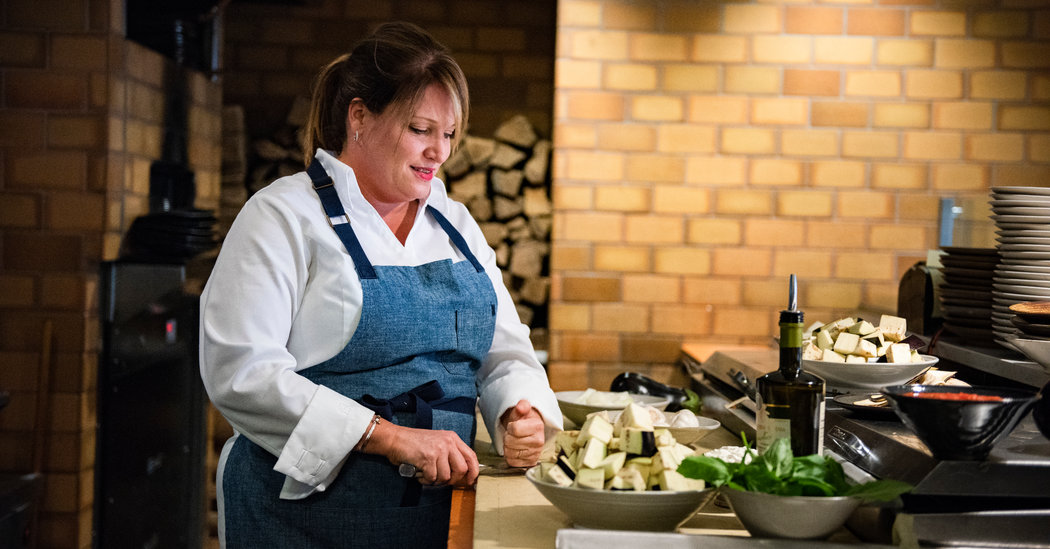
WASHINGTON — Amy Brandwein is a chef who has visions, and one of the tastiest involves eggplant.
Contemplating the penne alla Norma that was already on her menu at Centrolina, she imagined her favorite part of the dish — the ragù of golden chunks of fried eggplant coated in marinara sauce — piled high in the center of the plate. On top, she saw a mound of soft white cheese, a mix of ricotta and milky burrata that would slowly melt over the eggplant into a creamy puddle.
“I thought, lose the penne,” she said. “Let’s make the eggplant its own dish: pasta alla Norma — minus the pasta.”
The idea didn’t seem that radical to her, but when she replaced the penne dish with eggplant Norma, it was an instant hit. It was something her customers had never seen, and they loved it.
Ms. Brandwein, 48, has had visions before. Contemplating the gleaming, tiled cafes with adjacent groceries that she had seen in Rome, she could envision her own sleek, hip place right in the center of Washington. At its heart would be an open kitchen serving rustic, seasonal Italian cuisine, and on the side, a market selling the same high-quality local produce, seafood and imported condiments she would cook with.
That idea didn’t seem radical to her, either, but when she went to banks for financing, they repeatedly rejected her proposal.
It had nothing to do with her ideas or track record. Ms. Brandwein, who grew up in Arlington, Va., had the ideal résumé for the project, having been the opening chef at three other highly successful Italian restaurants, including Alba Osteria here and Casa Nonna in New York. But a big, ambitious restaurant in Washington owned by a female chef? The bankers, she said, could not imagine that.
“To them, I was doing something different — a woman opening a restaurant without any male partners,” she recalled as she shook a pan full of sweet, sliced onions over the fierce blue flames of her stove at Centrolina. “They wanted to see a hundred other successful businesses in the same model, but there weren’t a lot of comparable places to point to.”
“Comparable,” in the banks’ parlance, meant owned by a woman.
The pan hissed and sputtered as Ms. Brandwein poured tomatoes into the steaming onions, setting the pot to simmer into a heady sauce. Then she took out her chef’s knife and got to work on the eggplant, expertly slicing it into fat, even cubes, a bit larger than she would for a pasta topping. The girth of the pieces helps maintain their texture, she said, so they get crunchy on the outside without turning to mush within. She deep-fries the chunks in her ever-ready fryer at the restaurant; at home, a broiler gets the job done.
It took her four grueling years to gather the funding for Centrolina, cobbled together from a mix of small investors, colleagues and customers whom she talked into the deal, one at a time.
Financing secured, she put together her team, hiring women for all the management positions. She did this, in part, because she hoped that once the restaurant succeeded, it would stand as an example for other female chefs and entrepreneurs, as well as for the banks.
Centrolina’s success was immediate; since its doors opened in 2015, it has become one of the capital’s most popular dining destinations.
When you read the menu, the reason is obvious: Ms. Brandwein has a way of seeing Italian classics from a fresh angle. She seems to ask herself, is there a way to make an already wonderful dish even more delicious?
Sometimes the answer is no, and then she brings her exquisite technique to familiar dishes: grilled daily fish, or homemade ravioli with roasted squash, sage, butter and amaretto cookies.
But when the answer is yes, the results can be thrilling. She serves her burrata with caviar and homemade potato chips, her gnocchi with nebbiolo-braised goat, her buckwheat chitarra pasta with anchovy and chickpeas.
As for her higher ambitions? The restaurant business is finally changing, she said, and female chefs are getting at least a bit more of the respect and attention they’ve earned.




